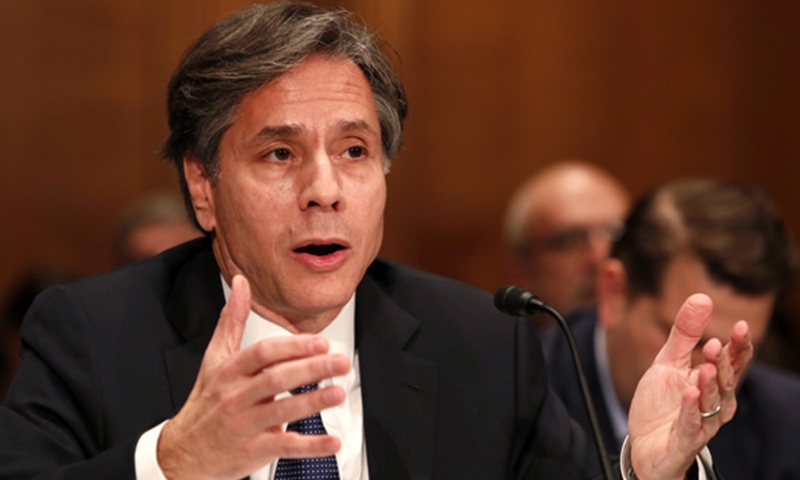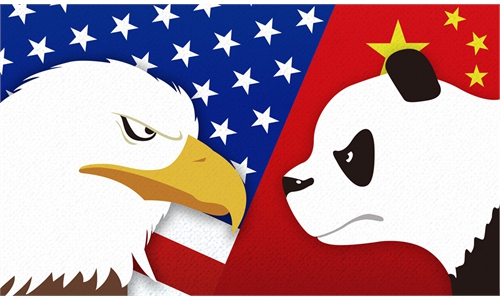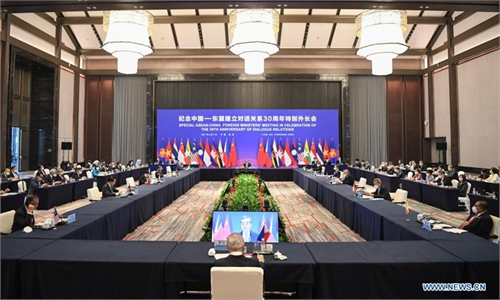
File photo:Antony Blinken
Closely following US Deputy Secretary of State Wendy Sherman's visit to China, US Secretary of State Antony Blinken is set to travel to India this week, with China reportedly among the topics.
While the US intends to seek support from India on a number of issues, the South Asian country may not be as cooperative, given the rising internal conflicts between the two sides concerning Afghanistan, vaccine distribution and human rights issues, observers noted.
Blinken is scheduled to meet Prime Minister Narendra Modi and Foreign Minister Subrahmanyam Jaishankar on Wednesday, which will be his first visit to "the world's largest democracy" as the secretary of state under the Biden administration, Reuters reported.
Such an arrangement, which closely follows Sherman's visit to China on Sunday and Monday, is seen as a sign that the US will rope in India to contain China and play "India card," analysts said.
Blinken's agenda will include Indo-Pacific engagement, addressing the climate crisis, and pandemic response, the US State Department said.
China will also be a hot topic as Washington sees India as a helping hand to "stand up to China's increasingly assertive behavior in Asia and beyond," Reuters reported.
"Seeing that India has common interests with the US on exerting influence in the Indo-Pacific region, Washington is trying to win over India to contain China," Wu Xinbo, director of the Center for American Studies at Fudan University in Shanghai, told the Global Times on Monday.
Blinken will also be looking to setting up an in-person meeting of the so-called Quad -Australia, India, Japan and the US - after holding a virtual summit in March, which is expected to focus on ways to develop regional infrastructure in the face of China's Belt and Road Initiative (BRI), Reuters reported.
In sharp contrast to Washington's stance, however, Chinese Vice Foreign Minister Le Yucheng said in July that China hopes that Western countries led by the US earnestly implement the infrastructure plans, build more roads and bridges for developing countries, and bring them more jobs and benefits, while adding that the BRI is open and inclusive for foreign cooperation plans.
Observers believe that India may not be as supportive as the US had expected on a variety of issues including China, in light of rising frictions between the two partners.
One of the major quarrels New Delhi and Washington are having is the US decision to withdraw its troops from Afghanistan, which has left India's investment in the region for the past 20 years hanging in the air, Long Xingchun, a senior research fellow with the Academy of Regional and Global Governance at the Beijing Foreign Studies University, told the Global Times on Monday.
"India has invested a lot in Afghanistan, including financial support and engineering projects to help Afghanistan train the army. With the US' sudden withdrawal, the deteriorating security situation in the country could mean a complete collapse of India's investment in the region, which could be a heavy blow to the Indian government," Long said.
What's more, India is growing increasingly dissatisfied with the US on the COVID-19 vaccine, as the US has been hoarding doses while Indians suffer from vaccine shortages, Wu told the Global Times.
Although the US might be showing kindness by offering more vaccines to the epidemic-battered country, it seems that the gesture would more often than not turn out to be an empty promise, Wu added.
On top of the vaccine friction, the White House has been bugging India with "human rights concerns" after the Modi government introduced a Citizenship Amendment Bill in December 2019 that Western voices deemed "anti-Muslim discrimination."
Dean Thompson, the State Department's acting assistant secretary for South and Central Asian affairs, confirmed that Blinken's trip to India will also raise human rights issues.


